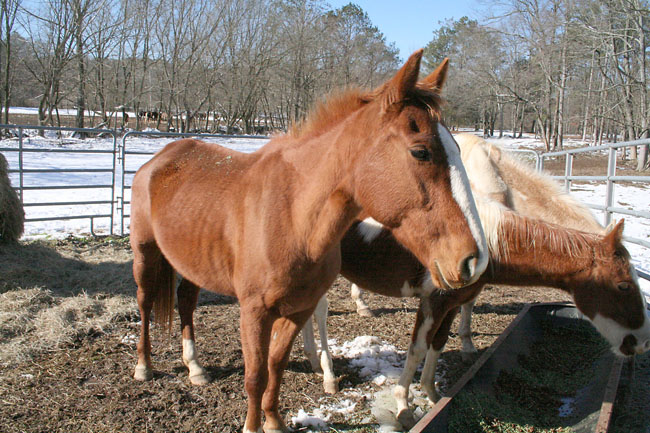 Staff Photo by Adam Crisp
Three horses recently confiscated by Whitfield County Animal Control are being cared for at Storybook Farms near Tunnel HIll, Ga. The farm has been home to nearly 30 malnourished animals over the last six years. Many horses have been abandoned in the wake of the economic downturn.
Staff Photo by Adam Crisp
Three horses recently confiscated by Whitfield County Animal Control are being cared for at Storybook Farms near Tunnel HIll, Ga. The farm has been home to nearly 30 malnourished animals over the last six years. Many horses have been abandoned in the wake of the economic downturn.TUNNEL HILL, Ga. -- American paint horses are supposed to be the definition of equine strength and agility.
But Phoenix, a 10-year-old paint stallion, is anything but the picture of health -- a painful sore in his mouth, split hooves, bony ribs poking through his dull and wiry coat.
Whitfield County sheriff's deputies say Phoenix and two other horses were so badly neglected, they were just days away from death, according to a report.
Late last week, deputies seized Phoenix along with a pregnant mare and a year-old colt after the horses' owners didn't respond to several requests to step up care of their animals.
The horses had been left without food or water for days, and state Department of Agriculture officials worried the horses would die very soon if conditions didn't improve.
Deputies arrested Kacey L. Johns, 31, and charged him with three counts of misdemeanor animal cruelty, according to an incident report.
The horses now are being nursed to health at Storybook Farm, a 67-acre horse rescue operation in Tunnel Hill that has been home to more than 30 neglected horses over the last six years.
Johns signed over ownership of the horses after his arrest. His wife told deputies he had taken the horses as payment for installing flooring in someone's home. He originally didn't want to part with the animals because he believed they were worth $3,000, the sheriff's report states.
DOCUMENT DOWNLOADSPDF: Police report
But Johns contends he was giving the animals proper care. He blames Phoenix's weight loss on the sore in his mouth and teeth problems. He said he didn't have enough time to correct the problems before the county seized his animals.
"They came out here one day, and a day and a half later they came back and took the horses," Johns said. "I don't know what they expected me to do in a day and a half."
Abandoned or neglected horses are a growing problem, one that has increased as the economy soured.
"People are constantly calling or e-mailing me for help, but I'm at my limit right now," said Crystal Montgomery, who operates Storybook on donations and proceeds from the sale of rehabilitated horses. "People call and say they lost their job or they are about to lose their house and they can't afford the horses anymore."
The plight is seen across the region, and most animal control agencies simply aren't equipped to deal with large-breed animals. The organizations rely on folks like Montgomery, 28, who founded Storybrook six years ago to care for older horses that were once used on trail tours.
"We lean on Crystal in these situations," said Don Garrett, director of the Whitfield Animal Shelter. "But this is going to continue to happen because people can't afford to pay their own bills, much less to feed a horse."
In Hamilton County, more horse owners are calling the Humane Educational Society for assistance, said Executive Director Guy Bilyeu.
"It's especially hard right now because of the holidays," Bilyeu said, with people having to decide between paying bills, buying Christmas presents or feeding horses.
"We try to provide food when someone needs assistance, and we also have a network of horse friends that will take horses if someone can't keep theirs anymore," he said.
Horses need to eat 1 to 2 percent of their body weight every day, which amounts to a food bill of about $100 a week per horse in the winter, Montgomery said.
HOW TO HELPStorybook Farms is in need of monetary contributions and donations of feed and other supplies to rehabilitate 20 or so horses on its farm. Donations also may be made the farm's veterinarian for the animal's medical care.For more information, call 706-260-7735 or visit www.storybook-farm.com.
Now that the animals are Montgomery's property, she'll spend a month or so feeding them and getting them proper veterinary care. Once they are healthy, she'll try to find them homes, but that's a difficult proposition because the market is flooded with needy horses.
To find homes, some purebred horses are auctioned off for $100 or less, Montgomery said. In better economic times, healthy horses with traceable bloodlines sold for anywhere from $1,000 to $20,000, she said.
Rehabilitating the horses is a passion for Montgomery, even if it's a cause that's grown much larger than she ever imagined.
"It's always sad when we get them, but you know now they are going to get better," Montgomery said. "And when we find them a good home, that's the best feeling."
Contact staff writer Adam Crisp at acrisp@timesfreepress.com or 423-757-6323.